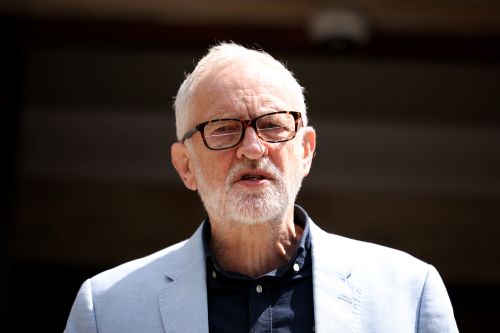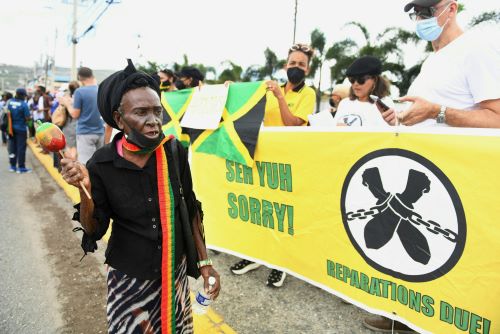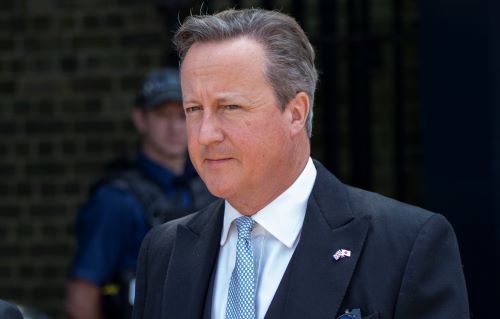We can’t build a future without facing the truth about slavery’s legacy
Former Labour leader Jeremy Corbyn recently gave a speech in Jamaica urging Britain to engage with Caribbean leaders on reparations. In this Voice article he outlines why addressing slavery's ongoing impact is critical to building a just future for all
December 28th 2024, Voice-Online.co.uk

IN BRITAIN, the story of slavery is often reduced to a simple morality tale about how a few benevolent White men like William Wilberforce brought an end to the slave trade.
It is a tale that conveniently obscures two things.
One, many politicians love to brag about the role Britain played in ending the slave trade, but are less keen to admit the role that Britain played in propping it up in the first place. It takes some effort to gloss over the previous two centuries of disgrace.
Two, these narratives wilfully ignore stories of enslaved people rising up to achieve emancipation for themselves. Long before the Abolition Act, a number of enslaved people led rebellions. The 1831 rebellion in Jamaica is remembered as a key turning point in the fight against slavery.
This rebellion was 200 years in the making, from the moment the British Empire reached Jamaica in 1655.
Britain had a particular interest in Jamaica because of its sugar cane production, and the abundance of large acres of land this demanded.
It was its “plantation potential”, so-to-speak, that meant Jamaica was considered the “jewel” of the Caribbean.

Slavery in the Caribbean was the embodiment of physical, sexual and psychological violence. As Eric Williams wrote in Capitalism and Slavery: “Strange that an article like sugar, so sweet and necessary to human existence, should have occasioned such crimes and bloodshed!”
As was the case across the Caribbean, the model of plantation slavery was not only the source of wealth, but of social control. So when slavery ended, the British needed a new means of enforcing the hierarchies it had created.
The end of slavery only came with new ways of oppression, and by the time Jamaica gained its formal independence in 1962, Britain had created a society of extreme inequality that persists to this day.
You will all remember David Cameron’s visit to Jamaica in 2015. Many people in Jamaica had hoped for an official apology for slavery and at least a discussion of the question of reparations.
David Cameron said no to both and offered to build a prison instead, to be populated by foreign nationals scheduled for deportation from the UK.
Today, David Cameron is not Prime Minister. The Conservative government is not in power. Many people in the UK and indeed around the world were relieved by the election of a Labour government in July.
Maybe this would be the beginning of a new approach to the world, a new approach to Britain’s past, and a new approach to reparations.
n October this year, the Prime Minister continued a long British tradition and ruled out slavery reparations.
In his words, he wanted to avoid “long and endless discussions about the past” and focus on “current future-facing challenges” instead.
From David Cameron to Keir Starmer, Britain’s Prime Ministers convince themselves of something bizarre: that reparations are somehow something that can be consigned to the past.
First of all, it is deeply ironic that one of the reasons why reparations are a so-called historic issue is precisely because the West has dithered and delayed for so long. The truth is, the longer Britain continues to drag its feet, the more the case for reparations grows.
Reparations are about building something new. They are about investing resources in those countries that have been held in economic bondage ever since the first slave ships arrived on their shores. Resources that could now be invested in healthcare, housing, and education.
This is why I never understand the arguments that reparations are about the past. No, they are about the present. They are about the kind of society that Britain could help Jamaica to achieve. They are about the future.
It is telling that, two years before his visit to Jamaica, David Cameron told the British public that “we should be proud of our Empire” and that “we should stop apologising for our imperial past.”

This was a reminder that there are people in Britain who don’t just wish to deny the role of the British empire, but celebrate it, and bring it back.
I will never forget the absurd outrage when, as Leader of the Labour Party, I suggested that schools should teach our children the truth about empire. We wanted to provide school programmes to ensure a deeper understanding of British history.
That’s because, currently, students will almost always learn about the UK’s triumph in World War 2. Far less common for children and students to learn about our history of slavery and exploitation.
Having Black History Month once a year is not good enough – we should be teaching about the history of colonialism, as well as the contributions Black communities have made to Britain, all year round. We need to teach our children that history is the contribution of all peoples of this planet.
It’s why, I believe, any discussion of reparations must start with something far more basic: a national reckoning with our colonial past.
Reparations are about truth and they are about justice – and that means recognising Britain’s role in crimes against humanity, no matter how uncomfortable that process of reflection may be.
An important part of that reflection is acknowledging the following truth: Britain’s foundations were built off the backs of others – of generations of enslaved and colonial subjects.
Walk around British cities like Liverpool, Bristol or London and you will see how the very foundations of our nation were built on the wealth from slavery and colonialism.
It was the extraction of wealth from slavery and colonialism ensured Britain could transition from an agricultural to an industrial nation. Houses, ports, cities, canals and banks were built with slave money. This infrastructure simply would never have existed without the wealth generated by slave labour.
Let’s be clear: the spoils of colonial wealth have not been shared equally. University College London launched an incredible database that allows you to find out the details of the families involved in slavery in the Caribbean, Mauritius and South Africa.
You will see it is the very richest. It is the former Prime Ministers. It is businesses. It is even tabloid newspapers.
It is the richest in our society who have benefited most from colonial wealth – and so it is the richest who should bear the burden of reparative justice.
So the struggle for reparative justice does not stand in contradiction with social justice. The struggle for reparative justice is part and parcel of the struggle for social justice.
There is, perhaps, no better example of the absurdity of the claim that reparations are about the past. And that’s climate change.
There is no natural justice: populations in countries that have contributed least to climate change will suffer the worst effects. The poorest 50% population is responsible for just 12% of global carbon emissions but is exposed to 75% of income losses.
This is no accident of history. This is the enduring legacy of colonialism, which was not just an act of brutality on people, but on our planet.
It was built on the idea that we should excavate as much land, dispossess as many people, and extract as much profit as possible. This idea long outlived slavery, and continues to exploit people and the planet for the sake of profit.
In the UK, we talk of climate change as an impending threat to life in the future. But for people across the Global South, climate change is here.
When governments in the West say that reparations are a thing of the past, they wilfully ignore the lasting inequalities that are putting vulnerable communities at risk of climate disaster.
Centuries of slavery and colonialism have created a profoundly unequal world that concentrates wealth and power in the hands of the global few.
Is it any wonder that delegations representing small and impoverished nations walked out of COP29? Let me say this loud and clear: climate reparations are colonial reparations. And climate justice is global justice.
Ultimately, reparations are not just about a lump sum payment. They are about resetting relations to build a more just future for us all. They are about building a new international economic order.
One that empowers communities – not the IMF and the World Bank – to decide its own economic future.
One that cancels debts in the Global South, which are trapping countries in cycles of repayment, and wasting resources that could be going to healthcare and education.
One that introduces a global wealth tax.
One that rejects trade agreements that undermine labour standards and exploit those who keep the world fed, moving and connected.
When I was Labour leader, I wanted to develop policies in a democratic fashion. The product was an entirely new foreign policy that broke with principles of domination and imperialism.
Reparations are about resetting our relations with the Global South, so that they are based on principles of mutual respect and equality, not outdated notions of charity or imperialist rule.
That means overturning a system of development that makes aid subservient to the UK’s own diplomatic, military or business interests.
That means reversing the agenda of privatisation that has taken hold in the development sector. Ultimately, it means joining a partnership of equals, based on global co-operation, in order to build a new international economic order, together.
Reparations are not something for the West to decide and determine. It should be a process led by Black voices in the name of global justice for us all.
A process that engages civil society and ordinary people. A process that empowers countries of Africa and the Caribbean to work together to provide common solutions to the problems they face.
It’s time to face up to our painful history – from the slave trade to the British Empire and beyond.
We need a vision to change the future, starting with the past.
Jeremy Corbyn has been the MP for Islington North since 1983. He served as Leader of the Opposition and Leader of the Labour Party from 2015 to 2020
